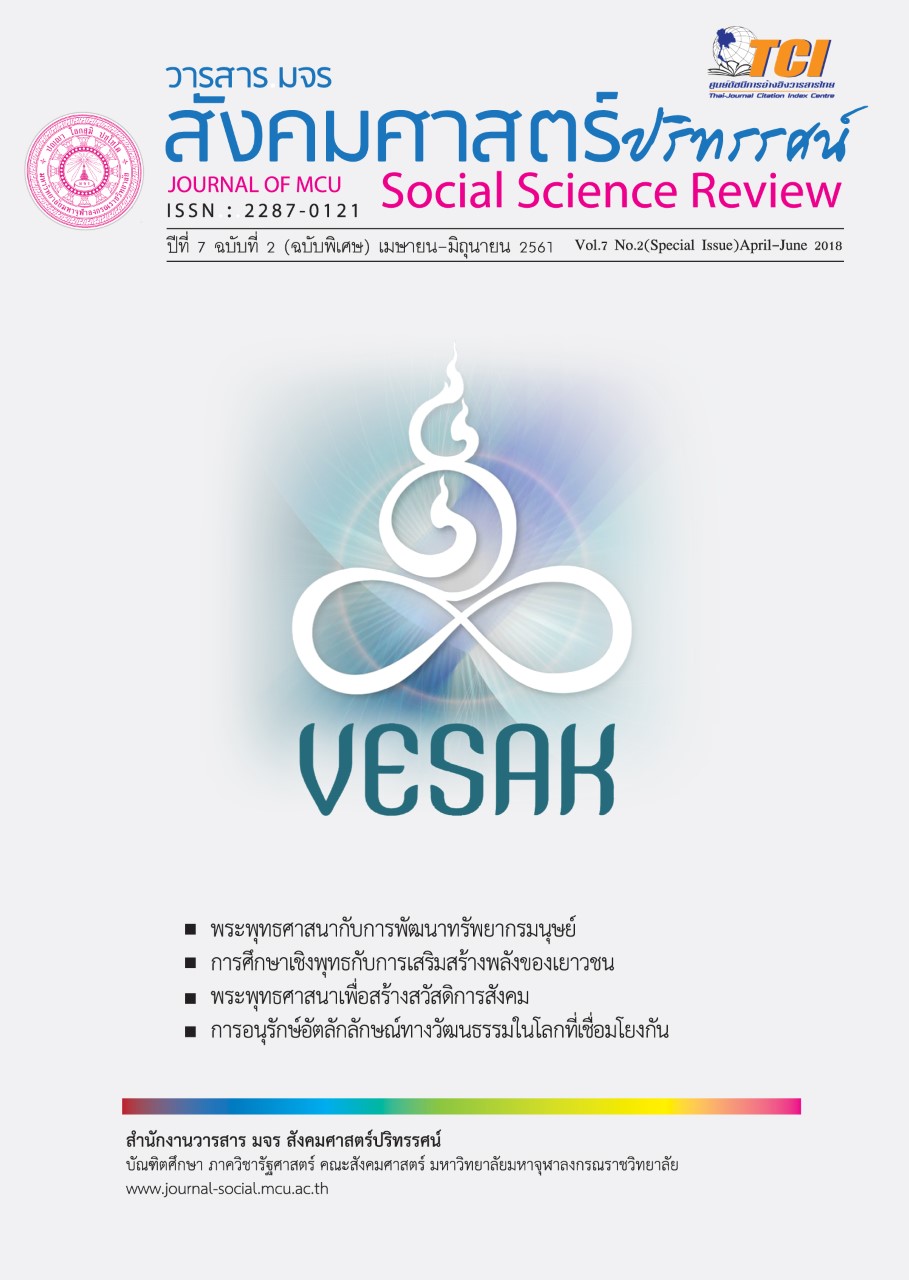รูปแบบการส่งเสริมคุณธรรมจริยธรรมสำหรับเยาวชน ของวัดในจังหวัดสิงห์บุรี
คำสำคัญ:
รูปแบบ, การส่งเสริม, คุณธรรมจริยธรรม, เยาวชนบทคัดย่อ
บทความนี้มีวัตถุประสงค์เพื่อ 1) ศึกษาสภาพทั่วไปในการส่งเสริมคุณธรรมจริยธรรมสำหรับเยาวชน ของวัดในจังหวัดสิงห์บุรี2) ศึกษาแนวทางในการส่งเสริมคุณธรรมจริยธรรมสำหรับเยาวชน ของวัด ในจังหวัดสิงห์บุรีและ 3) นำเสนอรูปแบบการส่งเสริมคุณธรรมจริยธรรมสำหรับเยาวชน ของวัด ในจังหวัดสิงห์บุรี
การวิจัยเป็นการวิจัยแบบผสานวิธี ด้วยการสัมภาษณ์เชิงลึก กับผู้ให้ข้อมูลสำคัญ จำนวน 24 รูปหรือคน เครื่องมือที่ใช้ในการวิจัย คือ แบบสัมภาษณ์แบบมีโครงสร้าง เก็บรวบรวมข้อมูลด้วยวิธีการบันทึกเสียง วิเคราะห์ข้อมูลแบบพรรณนาและการสนทนากลุ่มเฉพาะ กับผู้ให้ข้อมูลสำคัญ 9 รูปหรือคน เครื่องมือที่ใช้ในการวิจัย คือ แบบคำถามสนทนากลุ่มเฉพาะ
เก็บรวบรวมข้อมูล วิเคราะห์ข้อมูลแบบพรรณนาและการวิจัยเชิงปริมาณ โดยการวิจัยเชิงสำรวจ กับกลุ่มตัวอย่าง จำนวน 183 รูป เครื่องมือที่ใช้ในการวิจัย คือ แบบสอบถาม เก็บรวบรวมข้อมูลด้วยตนเอง วิเคราะห์ข้อมูลโดยใช้โปรแกรมสำเร็จรูปทางสังคมศาสตร์ สถิติที่ใช้ คือ ค่าร้อยละค่าเฉลี่ย และส่วนเบี่ยงแบนมาตรฐาน
ผลการวิจัยพบว่า
- สภาพทั่วไปในการส่งเสริมคุณธรรมจริยธรรมสำหรับเยาวชน ของวัดในจังหวัดสิงห์บุรี พบว่า จุดแข็ง มี 2 ข้อ คือ 1.1 สถานศึกษามีเพียงพอ 1.2 เด็กได้รับการศึกษาที่เหมาะสม จุดอ่อน มี 3 ข้อ คือ 2.1 เยาวชนมีพฤติกรรมไม่เหมาะสม 2.2 พบเด็กกลุ่มเสี่ยง อาทิเช่น ติดเกมส์ ติดยาเสพติด และตั้งครรภ์ก่อนวันอันควร โอกาส มี 1 ข้อคือ 3.1 พ่อแม่มีเวลาอบรมลูก และอุปสรรค มี 1 ข้อ คือ 4.1 การใช้สื่อออนไลน์ในทางไม่สร้างสรรค์
- แนวทางในการส่งเสริมคุณธรรมจริยธรรมสำหรับเยาวชน ของวัด ในจังหวัดสิงห์บุรี ประกอบด้วยวิธีการ 5 ส่วน คือ 1) ด้านหลักสูตร ต้องพัฒนาหลักสูตรคุณธรรมจริยธรรมที่วัดดำเนินการอยู่ให้ดีขึ้น คือ ค่ายคุณธรรมจริยธรรม เช่น ค่ายวัยใส ค่ายวัยรุ่น ค่ายพักค้างแรม เป็นต้น2) ด้านผู้เข้าอบรม กลุ่มเป้าหมาย คือ เยาวชนแต่ละรุ่นควรมีจำนวนไม่มากและ ไม่น้อยเกินไป3) ด้านวิทยากร วิทยากรต้องผ่านการอบรมการจัดกิจกรรมอบรมค่ายคุณธรรม มีประสบการณ์ที่มีความเชี่ยวชาญในกิจกรรมด้านต่าง ๆ4) ด้านการจัดการ ต้องพัฒนาสถานที่ เช่น หอพัก ห้องน้ำ บริเวณรอบนอก ความสะอาด และความปลอดภัย เป็นต้น) ด้านงบประมาณ จัดทำงบประมาณค่าย ที่แสดง ให้เห็นถึงที่มาของเงิน เพื่อดำเนินงานค่ายและจัดทำรายละเอียดค่าใช้จ่ายต่าง ๆ จัดทำระบบบัญชีและการเงินในค่ายพร้อมทั้งจัดเตรียมเอกสารที่เกี่ยวข้อง จัดประชุมผู้เกี่ยวข้องด้านการเงิน เพื่อวางแผนการใช้จ่ายงบประมาณให้เพียงพอ
- รูปแบบการส่งเสริมคุณธรรมจริยธรรมสำหรับเยาวชน ของวัด ในจังหวัดสิงห์บุรี ได้แก่ 1. ด้านความขยันการปลูกฝังนิสัยเพื่อเพิ่มประสิทธิภาพในการทำงานมีความเพียร ความพยายาม ขยัน หมั่นประกอบ หมั่นกระทำสิ่งนั้นด้วยความพยายาม เข้มแข็ง อด ทน2. ด้านความประหยัดนำหลักปรัชญาของเศรษฐกิจพอเพียงมาใช้ในวิถีชีวิตการกระทำทั้งหลายต้องเกิดจากจิตสำนึกหรือความตระหนักในคุณและโทษที่มีต่อตนเองและส่วนรวมจนเกิดสำนึกรับผิดชอบ ซึ่งเป็นรากฐานของจิตใจเป็นปัจจัยภายในที่ต้องการอาศัยการ บ่มเพาะอย่างต่อเนื่อง3. ด้านความซื่อสัตย์การปลูกฝังความซื่อสัตย์สุจริตช่วยให้เด็กเกิดการเรียนรู้ที่จะควบคุมความประพฤติของตนเอง ขณะอยู่กับผู้อื่น4. ด้านความมีวินัยความมีวินัยในการแสดงความเคารพความมีวินัยในการรักษาความสะอาดความมีวินัยในการรักษาความเป็นระเบียบ5. ด้านความสุภาพปลูกฝังให้เด็กมีความตั้งใจจริงในการปรับปรุงพัฒนาการพูดของตัวเอง6. ด้านความสะอาดการดูแลรักษาร่างกายและของใช้ให้สะอาด รักษาฟันให้แข็งแรงและแปรงฟันทุกวันอย่างถูกต้อง ล้างมือให้สะอาดก่อนกินอาหารและหลังการขับถ่าย กินอาหารสุก สะอาด ปราศจากสารอันตราย และหลีกเลี่ยงอาหารรสจัด สีฉูดฉาด งดบุหรี่ สุรา สารเสพติด7. ด้านความสามัคคี มอบหมายงานให้เด็กได้ทำงานเป็นกลุ่ม เริ่มจากการทำงานเป็นคู่8. ด้านความมีน้ำใจ การช่วยเหลือเกื้อกูล ให้ความรักแก่ผู้อื่น และให้ความร่วมมือ ช่วยเหลืออย่างสุดความสามารถด้วยความจริงใจที่มี ก็ย่อมเป็นที่รัก ที่ต้องการ เป็นคนมีคุณค่าต่อสังคม และเป็นที่ชื่นชมของผู้อื่นเสมอ
เอกสารอ้างอิง
rajavidyalaya University.
PhraMahaKritsadakittiSophanoSae Lee. (2014).The Model of Promoting the Moral Ethics in the School of Dhamma Instructor.(Doctor of thesis)Buddhist management. Bachelor's Degree: Mahachulalongkornrajavidyalaya University.
PhraWisithSutthipatthada. (2010).The Development of Buddhist Ethics of Basketry Village: A Case Study of the Basketry Group." PhanatNikhom District Chonburi province.(Research Report).Mahachulalongkornrajavidyalaya- University.
VeerachanAnanteser. (2014). The Strategy for Ethical Development for the Youth of Wat Thai.(Doctor of thesis)Graduate School: Mahachulalongkorn-
rajavidyalaya University.
YannapatYodkheaw.(2011).The relationship between exposure Knowledge and attitude towards the ASEAN community of Dharma Speakers(Research Report)NakhonPathom: NakhonPathomRajabhat University.
ดาวน์โหลด
เผยแพร่แล้ว
รูปแบบการอ้างอิง
ฉบับ
ประเภทบทความ
สัญญาอนุญาต
ลิขสิทธิ์ (c) 2020 วารสาร มจร สังคมศาสตร์ปริทรรศน์

อนุญาตภายใต้เงื่อนไข Creative Commons Attribution-NonCommercial-NoDerivatives 4.0 International License.
เพื่อให้เป็นไปตามกฎหมายลิขสิทธิ์ ผู้นิพนธ์ทุกท่านต้องลงลายมือชื่อในแบบฟอร์มใบมอบลิขสิทธิ์บทความให้แก่วารสารฯ พร้อมกับบทความต้นฉบับที่ได้แก้ไขครั้งสุดท้าย นอกจากนี้ ผู้นิพนธ์ทุกท่านต้องยืนยันว่าบทความต้นฉบับที่ส่งมาตีพิมพ์นั้น ได้ส่งมาตีพิมพ์เฉพาะในวารสาร มจร สังคมศาสตร์ปริทรรศน์ เพียงแห่งเดียวเท่านั้น หากมีการใช้ภาพหรือตารางหรือเนื้อหาอื่นๆ ของผู้นิพนธ์อื่นที่ปรากฏในสิ่งตีพิมพ์อื่นมาแล้ว ผู้นิพนธ์ต้องขออนุญาตเจ้าของลิขสิทธิ์ก่อน พร้อมทั้งแสดงหนังสือที่ได้รับการยินยอมต่อบรรณาธิการ ก่อนที่บทความจะได้รับการตีพิมพ์ หากไม่เป็นไปตามข้อกำหนดเบื้องต้น ทางวารสารจะถอดบทความของท่านออกโดยไม่มีข้อยกเว้นใดๆ ทั้งสิ้น





